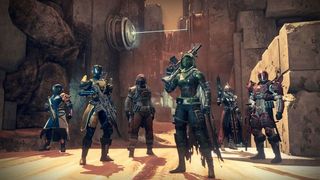The Taken King, and the troublesome double life of Destinys Crucible
Trials of Osiris is my favourite aspect of Destiny. Back in May, Bungie pushed competitive gaming and Destiny together and told them to kiss - and it was love at first sight. Trials feels like such an extreme departure from vanilla Crucible because it is unforgiving, fraught with risk, and demands high levels of communication and teamplay as well as straightforward twitch skill. It’s stressful, sure, but if you’re into hardcore PvP then it’s a happy kind of stress. It’s the mode you play when you want to be made to work - when you want to be put on trial.
Its introduction in House of Wolves was notable because it expanded Destiny’s PvP offering in such a different direction. Having now spent a week with The Taken King’s new modes, I’m struck by how much that difference has grown. The Crucible now leads a double life: hardcore competitive shooter on one hand, knockabout arena on the other. Emblematic of this divide, appropriately enough, is a game mode called Rift.

Rift sits somewhere between single-flag CTF and American football, with teams jostling over a ‘spark’ that spawns in the centre of the map before attempting to run it all of the way to a ‘rift’ deep in the enemy’s half. I've adored capture the flag and its variants since Quake, through Team Fortress and Tribes to Halo. I'm pleased that Rift finally brings proper old-school objective-based multiplayer to Destiny - and, what’s more, I’m pleased that Bungie hasn’t been content to stick with the old formula.
The studio has cleverly teased out some of the strengths of this gametype, and suppressed its weaknesses. For example: landing a flag capture has always felt brilliant, and Rift makes that moment bigger and more impactful. You don’t just deliver the spark - you slam-dunk it into a glowing energy portal, causing an explosion that can rack up a bonus killing spree. On the other hand, getting tagged inches from the finish line doesn’t sting quite as much as it used to: you get points for making progress, and those points contribute to your team’s victory, so defenders are encouraged to try to take you down in the field and not just camp the rift itself.
Rift is a team game, however - no other part of the Crucible save Trials of Osiris demands this much coordination. Not only is it absolutely brilliant to play when you’re in party with your friends, therefore, but it breaks terribly when you’re not. It sits south of Control and only a hair north of Elimination on the chart marked ‘modes most likely to make you break a controller if you’re playing by yourself’.

The rule is this: modes become more competitive, more strategic and more frustrating to play with strangers as individual players gain responsibility for their team’s success. Control occupies a sweet spot because the coordination it demands is slow and easy to understand, clearly represented by capture points. It is possible for a lone player to screw it up from time to time, usually by capping the third point and scrambling the respawns, but that’s relatively rare. Contrast with Rift, where teams have a very small window of time to pull off a complex and ad-hoc series of tactical plays, where one player - the spark runner - can tank their team’s chances with a single mistake.
All that risk and strategic depth is what makes Rift so exciting and gives it so much competitive viability. Dunking the spark at a key moment feels incredible. But it also grants even more of an advantage to parties who know each other and are happy to use voice chat. If you are unlucky enough to be placed on a team full of solo operators while facing a fireteam, you’ll see just how one-sided the Crucible can be. Honestly - and I’d never normally say this - you may as well just leave the game when that happens.
Sign up to the GamesRadar+ Newsletter
Weekly digests, tales from the communities you love, and more
Contrast with The Taken King’s other new mode, Mayhem. I’ve got less to say about it, honestly, but that’s because there’s much less to say. It’s team deathmatch on a short fuse, with everything from Supers to grenades to heavy ammo in a state of near-constant availability. Scores are multiplied by ten for no reason save that it’s fun: you don’t even need to wait a few seconds to respawn. Nothing feels like it matters, and the game is happy to shrug and laugh along with you. It’s not particularly balanced but it’s so quick and silly that you don’t care. If Rift is a fencing match, Mayhem is some drunks fighting in a bouncy castle. It doesn’t matter whether you play solo or in a team, whether you quit, whether you win: because it’s fun anyway, and nobody comes out of it with much dignity. Mayhem is a perfect fit for Destiny’s matchmaking system in a way that Rift simply isn’t.

This is the issue with Destiny’s double life: the game itself can happily support multiple ways to play, but the systems that surround multiplayer can’t. As with most modern online shooters, player choice has been stripped away in favour of a one-size-fits-all offering. The new Mercy feature, by which games can be ended early if they’re a total washout, feels like a tacit acknowledgement that fair matchmaking is competing for air with the need to find a game quickly.
Mayhem is the perfect mode for this type of matchmaking - quick, silly, consequence-free. But Rift absolutely isn’t. Rift would be better served by proper team-on-team options, ranked ladders, and custom games, the stuff that used to be normal. Otherwise finding a good game is left up to chance, and you have a situation where already-niche gametypes drive players away by making it difficult to see them at their best. Destiny is far from the only game to have this problem: the same unhappy marriage of frictionless modern matchmaking and old-school competitive ambition badly wounded Titanfall, and it killed Evolve.
‘Destiny needs custom games’ would be the familiar takeaway, here, but it goes deeper than that. Bungie should absolutely embrace the double life of the Crucible. It should pursue Destiny’s potential in every direction. But it needs to acknowledge that different player types need catering for in different ways, and that sometimes - always, I’d argue - the best way to cater to them is to give them the tools to play the game however they want.

New strategy game from legendary RTS devs behind StarCraft, Warcraft, and more has promised a reveal this summer

Atlas director teases influences behind the Jennifer Lopez-led sci-fi movie, from Titanfall to Castaway

Alien TV show confirms its place on the franchise timeline as Foundation star joins the cast
Most Popular





